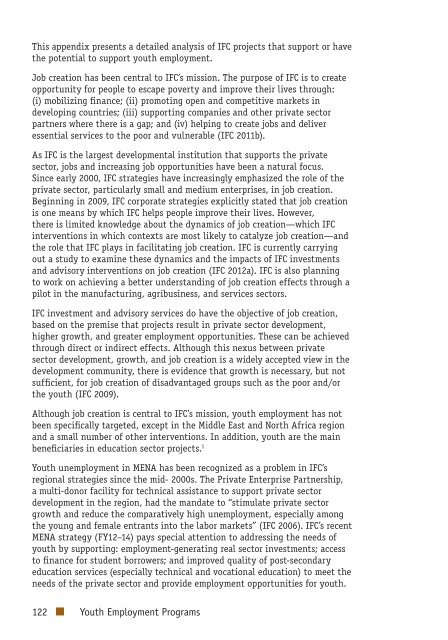Youth Employment Programs - Independent Evaluation Group
Youth Employment Programs - Independent Evaluation Group
Youth Employment Programs - Independent Evaluation Group
Create successful ePaper yourself
Turn your PDF publications into a flip-book with our unique Google optimized e-Paper software.
This appendix presents a detailed analysis of IFC projects that support or havethe potential to support youth employment.Job creation has been central to IFC’s mission. The purpose of IFC is to createopportunity for people to escape poverty and improve their lives through:(i) mobilizing finance; (ii) promoting open and competitive markets indeveloping countries; (iii) supporting companies and other private sectorpartners where there is a gap; and (iv) helping to create jobs and deliveressential services to the poor and vulnerable (IFC 2011b).As IFC is the largest developmental institution that supports the privatesector, jobs and increasing job opportunities have been a natural focus.Since early 2000, IFC strategies have increasingly emphasized the role of theprivate sector, particularly small and medium enterprises, in job creation.Beginning in 2009, IFC corporate strategies explicitly stated that job creationis one means by which IFC helps people improve their lives. However,there is limited knowledge about the dynamics of job creation—which IFCinterventions in which contexts are most likely to catalyze job creation—andthe role that IFC plays in facilitating job creation. IFC is currently carryingout a study to examine these dynamics and the impacts of IFC investmentsand advisory interventions on job creation (IFC 2012a). IFC is also planningto work on achieving a better understanding of job creation effects through apilot in the manufacturing, agribusiness, and services sectors.IFC investment and advisory services do have the objective of job creation,based on the premise that projects result in private sector development,higher growth, and greater employment opportunities. These can be achievedthrough direct or indirect effects. Although this nexus between privatesector development, growth, and job creation is a widely accepted view in thedevelopment community, there is evidence that growth is necessary, but notsufficient, for job creation of disadvantaged groups such as the poor and/orthe youth (IFC 2009).Although job creation is central to IFC’s mission, youth employment has notbeen specifically targeted, except in the Middle East and North Africa regionand a small number of other interventions. In addition, youth are the mainbeneficiaries in education sector projects. 1<strong>Youth</strong> unemployment in MENA has been recognized as a problem in IFC’sregional strategies since the mid- 2000s. The Private Enterprise Partnership,a multi-donor facility for technical assistance to support private sectordevelopment in the region, had the mandate to “stimulate private sectorgrowth and reduce the comparatively high unemployment, especially amongthe young and female entrants into the labor markets” (IFC 2006). IFC’s recentMENA strategy (FY12–14) pays special attention to addressing the needs ofyouth by supporting: employment-generating real sector investments; accessto finance for student borrowers; and improved quality of post-secondaryeducation services (especially technical and vocational education) to meet theneeds of the private sector and provide employment opportunities for youth.122 <strong>Youth</strong> <strong>Employment</strong> <strong>Programs</strong>
















